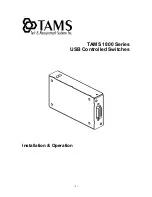
Introduction 15
authenticated using a shared key that is not sent over the network. In addition, the remote administrator passwords
are sent encrypted between the client (the switch) and the back-end server.
The GbE2 Interconnect Switch supports:
•
Only standard ASCII inbound login authentication. PAP, CHAP, or ARAP login methods are not supported. One-
time password authentication is also not supported.
•
Authorization privilege levels of only 0, 3, and 6. These map to management levels of user, oper, and admin,
respectively.
•
The accounting attributes of protocol, start_time, stop_time, and elapsed_time. For WebUI (BBI) users,
accounting stop records are only sent if the user presses the QUIT button.
Secure Shell and Secure Copy
Secure Shell (SSH) and Secure Copy (SCP) use secure tunnels to encrypt and secure messages between a remote
administrator and the GbE2 Interconnect Switch. Telnet does not provide this level of security. The Telnet method of
managing a GbE2 Interconnect Switch does not provide a secure connection.
SSH is a protocol that enables remote administrators to log securely into the GbE2 Interconnect Switch over a network
to execute management commands.
SCP
is typically used to copy files securely from one machine to another. SCP uses SSH for encryption of data on the
network. On a GbE2 Interconnect Switch, SCP is used to download and upload the switch configuration via secure
channels.
XModem
The GbE2 Interconnect Switch supports XModem for transferring files during direct dial-up communications. XModem
sends blocks of data in 128-byte blocks, and includes an error-detection system called a checksum. When the data is
received, the error detection system ensures that the entire message reached its destination. If not, the receiving
computer sends a request for retransmission of the data.
Internet Group Management Protocol (IGMP) Snooping
The GbE2 Interconnect Switch supports IGMP Snooping for multicasting, starting with Release 2.0. Both Version 1-
and Version 2-based IGMP Snooping is supported. In addition, auto detection of the multicast router port and manual
configuration of the multicast router port is supported. For efficient multicast traffic management, the IGMP Filtering
option is supported.
Jumbo frames
By default, the GbE2 Interconnect Switch module supports jumbo frames up to 9216 bytes, which may help reduce
server central processing unit (CPU) utilization and may increase application throughput. No configuration is
required. The GbE2 Interconnect Switch does not fragment frames as they exit, or assemble packets into jumbo
frames as they enter the switch.
Auto-MDI/MDIX
The GbE2 Interconnect Switch Ethernet ports are medium dependent interface (MDI)/MDI crossover (MDIX) capable.
MDI/MDIX is a type of Ethernet port connection using twisted pair cabling. The medium dependent interface (MDI) is
the component of the media attachment unit (MAU) that provides the physical and electrical connection to the cabling
medium. An MDI crossover (MDIX) is a version of MDI that enables connection between like devices. MDI ports
connect to MDIX ports via straight-through twisted pair cabling whereas both MDI-to-MDI and MDIX-to-MDIX
connections use crossover twisted pair cabling. The GbE2 Interconnect Switch has the capability to automatically
detect the cable selection/type, making the distinction between a straight-through cable and a crossover cable
unimportant.
Auto-negotiation of duplex mode and speed
Auto-negotiation of duplex mode and speed can be configured on the GbE2 Interconnect Switch. Network adapters
that support multiple data speeds, such as Fast Ethernet and Gigabit Ethernet, choose the speed at which they run
through a procedure called auto-negotiation. Auto-negotiation involves probing the capability of the network using
low-level signaling techniques to select compatible Ethernet speeds. Auto-negotiation was originally developed to
make the migration from traditional Ethernet to Fast Ethernet products easier.
















































